Stephen Morris's Blog, page 3
May 23, 2023
St. Dunstan’s and All Saints, Stepney
 The monthly Curry Club meeting
The monthly Curry Club meeting  Dinner with the wardens and staff
Dinner with the wardens and staff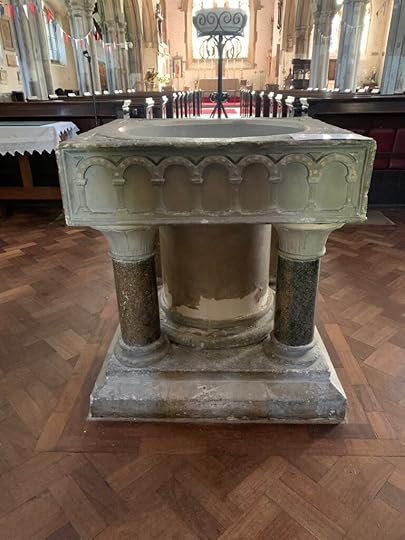 12th century font
12th century font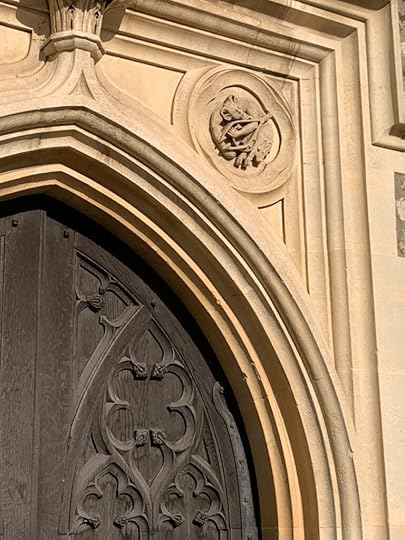 15th century front door of the church
15th century front door of the church  Scenes from my visit to the Church of St. Dunstan’s and All Saints, Stepney (London)
Scenes from my visit to the Church of St. Dunstan’s and All Saints, Stepney (London)The parish of St. Dunstan’s and All Saints (commonly known simply as “St. Dunstan’s”) in the East End of London was the last church a seagoing ship would pass and the first church a ship would pass returning to port. All births and deaths at sea were recorded there. It is “the parish of the high seas” and many–if not most–people coming to the North American colonies passed by St. Dunstan’s.
It was a wonderful experience to visit our sister parish in London! The parish was dedicated by St. Dunstan in the tenth century; the stone church he built replaced an even older wooden church. The sense of history is palpable—just beneath the surface of everything. Scratch a stone and so much history pours out—most of the altar area of the current church was built in 13th century, though a small portion of it dates from the time of St. Dunstan himself in the 10th century. The current nave was built in the 14th century and the bell tower dates from the 15th century.
St. Dunstan himself was bishop of London and then archbishop of Canterbury. He is said to have been a skilled metal worker and there are several folktales of him besting the devil with pincers, hammers, nails, and horseshoes–all tools found in a metalworking forge. (St. Dunstan’s red-hot pincers, which he used to grab the devil by the nose, appear next to the front door of the church.)
The area around the parish–the East End of London–was heavily bombed during WWII as the Nazis attempted to disrupt British naval operations and capabilities. Although the church building was not damaged, the medieval windows were blown out; the current windows are modern post-war replacements. The window above the high altar shows Christ in glory on the Cross presiding over the resurrection of the East End after the war.
Here’s to many more visits between the Church of the Good Shepherd, Kips Bay (Manhattan) and St. Dunstan’s, Stepney (London)!
See more about St. Dunstan’s, Stepney here and here.
 Approaching the church through the cemetery which was used from the early Middle Ages through Victorian times
Approaching the church through the cemetery which was used from the early Middle Ages through Victorian times The post St. Dunstan’s and All Saints, Stepney appeared first on Stephen Morris, author.
May 7, 2023
Back on May 23
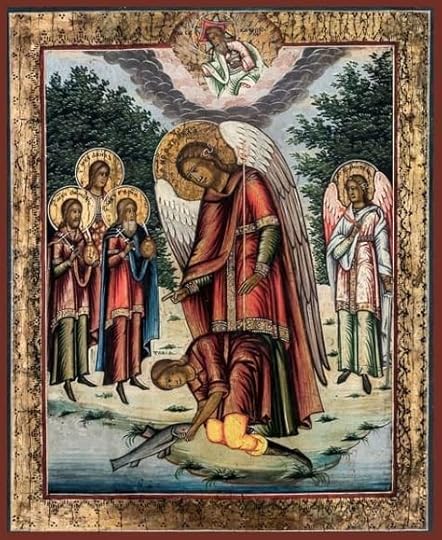
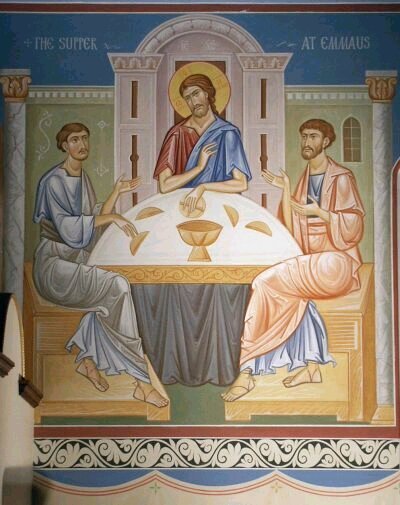 SS. Luke and Cleopas, travelers to Emmaus, are among the patrons and protectors of people traveling, as are SS. Raphael the Archangel and Tobias.
SS. Luke and Cleopas, travelers to Emmaus, are among the patrons and protectors of people traveling, as are SS. Raphael the Archangel and Tobias. I am away preaching at our sister parish of St. Dunstan’s and All Saints, Stepney (London) and will be blogging again the week of May 23. Remember me in your prayers. Light a candle on my behalf, as well as for the parish of Good Shepherd, and Fr. Trevor with the parish of St. Dunstan’s and All Saints.
The post Back on May 23 appeared first on Stephen Morris, author.
May 2, 2023
Satan Disguises Himself
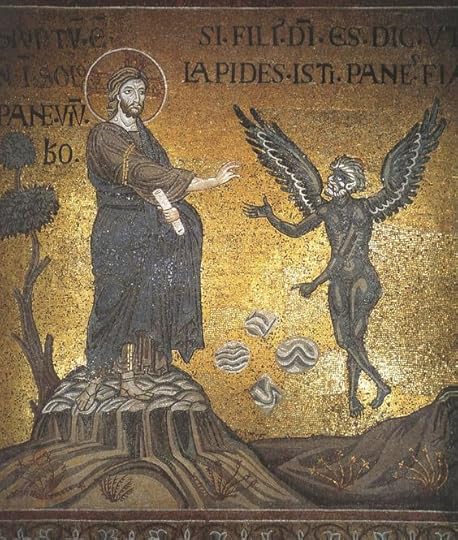 Medieval Byzantine-style mosaic depicts Satan tempting Christ in the desert: “If you are the Son of God, make these stones into bread.” Christ answers: “Man does not live by bread alone.”
Medieval Byzantine-style mosaic depicts Satan tempting Christ in the desert: “If you are the Son of God, make these stones into bread.” Christ answers: “Man does not live by bread alone.”For such people are false prophets, deceitful workers who are disguising themselves as apostles of Christ. And no wonder, for Satan disguises himself as an angel of light. It is no great surprise, then, if his servants disguise themselves as servants of righteousness; for their end will be according to their works. (2 Cor. 11:13-15)
St. Paul warns the Corinthians that his enemies, who call themselves the super-apostles, are liars and deceivers who are not true apostles at all. They are servants of Satan, pretending to be something they are not just as Satan himself can pretend to be something he is not.
Evil apes respectability and weeds do their best to look like wheat. But whatever similarity they have to wheat is betrayed by what they taste like …. We therefore need the grace of God, a sober mind and watchful eyes, so that we do not eat weeds instead of wheat and make ourselves sick; nor to mistake the wolf for a sheep and be attacked; and not to mistake the death-dealing devil for a good angel and be devoured.
St. Curil of Jerusalem, Catechetical Lectures 4.1
Satan began as an angel of light. He was, in fact, the brightest of the angels. But he rebelled against God and became the enemy, the deceiver, the liar, and the pretender. Based on hints in the Old and New Testament, we think that about 1/3 of the angels joined his rebellion. Some early theologians thought that humans were created to replace the fallen angels in the Kingdom of God. But others say that Satan and his followers rebelled because they were jealous of the love and attention that the Holy Trinity gave to the human race.
Theologians who specialize in angels tell us that once an angel has chosen to be faithful to God or not, that angel cannot change their mind. That’s why we can trust our guardian angels to not suddenly “switch sides” and lead us away from God once we have begun to trust them and their guidance. We can hope that the fallen angels will be able to repent but we can’t depend on it.
In fact, it’s our ability to repent that makes us superior to the angels. We can repent because we have bodies and are not simply pure intellects as the angels are. But we must still guard ourselves. We can deceive and lie to ourselves, if not other people. We can think we are devout lovers of God but if we claim to love God but hate or ignore our fellow human beings, we do not actually love God.
The super-apostles in Corinth deceived themselves even more than they deceived their fellow Corinthians. Satan deceives himself more than he deceives any of us. Self-deception, in Russian called prelest, is the most dangerous trap we can fall into. That’s why frequent, thorough self-examination against objective standards is so important. There are many “Guides to self-examination” available, often based on the Ten Commandments or the eight Beatitudes or the Seven Virtues. The important thing is to use them and keep checking ourselves against them and admitting–going to Confession–when we have failed to live up to them.
Rather than lie to ourselves, we can embrace and walk in the light with the angels.
The post Satan Disguises Himself appeared first on Stephen Morris, author.
April 25, 2023
Did Eve Conceive in Her Ear?
 In the Psalter-Hours of Guiluys de Boisleux (France, after 1246), we see Adam, Eve, and the serpent with the Forbidden Fruit; then we see Adam and Eve hiding their nakedness from God the Son with fig leaves.
In the Psalter-Hours of Guiluys de Boisleux (France, after 1246), we see Adam, Eve, and the serpent with the Forbidden Fruit; then we see Adam and Eve hiding their nakedness from God the Son with fig leaves. But I am afraid that somehow, just as the serpent deceived Eve by his cunning, your minds may be led astray from the sincerity and the purity you have toward Christ. For if a newcomer preaches another Jesus whom we did not preach, or if you have received a different spirit whom you did not receive [from us], or a different gospel–you tolerate that person well enough. (2 Cor. 11:3-4)
St. Paul says that he betrothed the parish in Corinth to Christ as a virgin is married to her groom. But he is afraid that they will listen to false teachers, just as the virgin Eve listened to the serpent.
That serpent never physically defiled Eve, did he? Yet he did destroy her virginity of heart …. the church is a virgin; she is a virgin now and may she remain a virgin forever. Let her [the Church] beware of the deceiver …. Are you perhaps going to say to me: If the Church is a virgin, how does she produce children [in the font]? She imitates Mary, who gave birth to Our Lord. Did not the holy Mary bring forth her child and remain a virgin? So, too, the Church brings forth children and is a virgin.
St. Augustine of Hippo, On Converts and the Creed
The serpent is described in Genesis as “crafty” and “cunning.” These are insults, not compliments. Today, we might say “shady” and “deceptive.” The serpent lied. Eve listened to those lies and the serpent seduced her. She took the serpent’s words into herself through her ears.
Through her hearing, Eve conceived disease, death, and decay. Through her hearing, the Virgin Mary conceived the Word made flesh. Because Eve listened to the serpent and brought Death into the world, some early preachers suggested that she conceived Cain–who killed his brother Abel–by the serpent whispering in her ear. Contrasting this with the Virgin’s consent to the angel Gabriel’s request that she bear the Word of God, these preachers also suggest that Mary conceived Christ through her ears, by hearing.
The Church gives birth to her children in the font. But these children are conceived by hearing as well. “How are they to believe, unless they hear a preacher? And how are they to hear a preacher, unless one is sent?” (Romans 10:14) Ears and hearing are fundamental to [spiritual] reproduction! Who’d athunk it?!
The post Did Eve Conceive in Her Ear? appeared first on Stephen Morris, author.
April 18, 2023
Was St. Paul a Poor Speaker?
 Paul Preaches in Damascus, as depicted in the AD 1140s Norman mosaics in the Palatine Chapel in Palermo. Note that the apostle is depicted as bald, with a large forehead but not especially short; this could be because he was the most important figure in the scene. Size indicated importance, not historical biographical information.
Paul Preaches in Damascus, as depicted in the AD 1140s Norman mosaics in the Palatine Chapel in Palermo. Note that the apostle is depicted as bald, with a large forehead but not especially short; this could be because he was the most important figure in the scene. Size indicated importance, not historical biographical information.I myself, Paul, appeal to you by the meekness and gentleness of Christ–I who admittedly am humble when face to face among you but, when absent, bold to you…. I do not want to seem as if I were frightening you with letters. For someone says, ‘His letters are weighty and strong, indeed, but his bodily presence is weak and his speech amounts to nothing.’ Let this person realize that we will be the same person in action when we are present there with you as we are in letters when we are absent. (2 Cor. 10:1, 9-11)
Paul’s enemies in Corinth accused him of writing harsh, demanding letters that were full of fire and arrogance but that when he was actually present among them, his attitude was completely different. His enemies said that, in person, he was a weak and sniveling coward who could only beg them to do what his letters demanded they do in his absence.
Early Christian records indicate that St. Paul was not physically impressive. Early records suggest that St. Paul was short and bald and that his voice was high-pitched, difficult to listen to for very long. His face might have been ruddy and flushed. In traditional icons, St. Paul is generally depicted as a bald man with a large forehead holding a book (his letters in the New Testament) and a sword (because he was beheaded). We know that he was longwinded because he preached long past midnight and a young man (Eutychus), sitting on a windowsill, fell asleep and then fell out the window and broke his neck; Paul was able to raise him from the dead but that doesn’t stop us from realizing that the apostle liked to talk and talk and talk and talk (Acts 20:7-12).
(Some contemporary records indicate that St. John Chrysostom, another famous preacher, also had a high-pitched, whiney voice that was difficult to hear or listen to. That might be one reason that St. John moved the place the bishop preached from in Constantinople closer to the people: so that they could hear him more easily.)
Whether St. Paul was tall and handsome or short and difficult to listen to, his words were inspired and inspiring. He must have had a significant impact when he preached in person or we would not have the records of the many parishes he founded in his missionary journeys. But is it interesting to know more about him personally and how God could use him to accomplish his divine purposes.
Even if we think we are not impressive or important, God can still use us as well. Maybe we aren’t good speakers but we can pray for people. We can invite them to church or church events with us. Maybe we are good at writing on Facebook and sharing our theological musings. We must never “sell ourselves short” because God certainly doesn’t.
Even if we aren’t very tall. 
The post Was St. Paul a Poor Speaker? appeared first on Stephen Morris, author.
April 4, 2023
Reap What You Sow
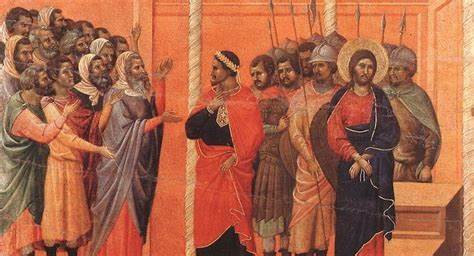 “Christ Accused by the Pharisees” by Duccio di Buoninsegna, c. 1308-11. On display at the Museo dell’Opera Metropolitana del Duomo, Sienna.
“Christ Accused by the Pharisees” by Duccio di Buoninsegna, c. 1308-11. On display at the Museo dell’Opera Metropolitana del Duomo, Sienna. The slender spiral columns of white marble and the decoration carved along the top of the walls seem to refer to classical architecture. Pilate too, portrayed with the solemnity of a Roman emperor and crowned with a laurel wreath, evoking classical antiquity.
As in the gospel, the group of Pharisees, animated by lively gestures (again the hand with pointing finger), is depicted outside the building: the Jews avoid going inside in order not to be defiled and to be able to eat the Passover meal.
You should keep this in mind: the one who sows sparingly will also reap sparingly, but the one who sows generously will also reap generously. Let each give what has been decided in his or her heart, not reluctantly or with grumbling, for “God loves a cheerful giver” (Proverbs 22:8).
St. Paul is writing about the special collection he is making to buy food for the parish in Jerusalem that is suffering because of a famine. He is promising the people in Corinth that if they are generous to the hungry in Jerusalem, God will be generous to them … here and now, but especially on Judgement Day.
Although St. Paul was writing about money and a special collection in a specific time and place, his words apply to all times and all places whether money is involved or not. If we give our time, our attention, our energy–if we offer a shoulder to cry on or an ear to listen–God will notice that gift and if we gave that gift without grumbling, God will be generous with what he gives to us.
During Holy Week, the importance of cheerful giving in a variety of circumstances appears many times in the hymns, prayers, and readings. Peter refuses to give Christ the opportunity to serve when he refuses to let Christ wash his feet; then he wants too much service, offering–demanding?–that Christ wash his head and face as well. A woman washes Christ’s feet and another woman anoints his head with very expensive perfume and other people complain loudly. Pharisees grumble about the attention Christ insists they give him and his importance in the life of Israel. Romans are furious at being asked to give reconsideration to their political ideas. Apostles are afraid to give any public allegiance to Christ because they might be arrested or executed together with him.
Giving time and attention to prayer or church services this week? Doesn’t seem that much to ask now, does it? Coming to church cheerfully, without grumbling about it? Even better!
Read more about Holy Week and Judas’ complaints about a woman’s generosity in a previous post here.
The post Reap What You Sow appeared first on Stephen Morris, author.
March 28, 2023
Rich By His Poverty
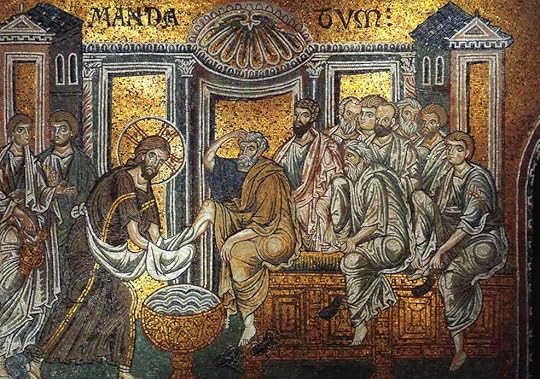 One of the greatest existent examples of Norman architecture, the cathedral in Monreale, Sicily was begun in 1174 by William II of Sicily. In 1182 the church, dedicated to the Nativity of the Virgin Mary, was complete. The stunning mosaics were added one hundred years later.
One of the greatest existent examples of Norman architecture, the cathedral in Monreale, Sicily was begun in 1174 by William II of Sicily. In 1182 the church, dedicated to the Nativity of the Virgin Mary, was complete. The stunning mosaics were added one hundred years later.For you know the grace of our Lord Jesus Christ: though he was rich, he became poor for your sake, so that you might become rich by his poverty …. For if that desire is present, the gift will be acceptable according to what one may have, not according to what one does not. (2 Cor. 8:9, 12)
St. Paul is raising money to aid the parish in Jerusalem because there is a famine there, adding to the political troubles facing the area which would soon boil over into open revolt against Rome and cause the Romans to tear down the Temple. He’s saying that the Corinthians will get “credit” from God based on what they want to give, even if their actual financial situation does not allow them to be as generous as they would like to be.
It’s always tricky to talk about God giving “credit” to humans. But we understand that impulse because we honor the intention if the person is unable to follow through, through no fault of their own. It’s a different situation if the person promises what they know they cannot deliver, raising hopes that can never be achieved.
God acknowledges–gives “credit”–our faith, our hopes and trust in him, and in our brothers and sisters. So this passage of 2 Corinthians is about more than fundraising. St. Paul is also talking about how we become rich through Christ’s poverty even if we don’t always follow through on being poor in spirit, forgiving as we have been forgiven, sharing our resources with those who have less–less time, less cash, less emotional bandwidth to bear whatever their current situation is. If we WANT to be as forgiving and as poor in spirit, etc. that’s at least a start. It’s something. Even if we don’t always live up to our intentions. But as the famous Easter sermon says,
… the Master is gracious and receives the last, even as the first; he gives rest to him that comes at the eleventh hour, just as to him who has labored from the first. He has mercy upon the last and cares for the first; to the one he gives, and to the other he is gracious. He both honors the work and praises the intention.
Paschal Homily, attributed to St. John Chrysostom
Christ takes off all his clothes in order to wear a towel and wash our feet. He hangs naked on the Cross. Holy Week makes us rich. The point of wealth is to share it. How can we share some of what we are given during Holy Week? Even if we can’t do everything we want to make those riches accessible to ourselves or others, we can at least do something. We can do a little bit more than we did last year. We can be present. We can at least begin to want to intend to receive those riches and then share them with someone else.
What human being could know all the treasures of wisdom and knowledge hidden in Christ and concealed under the poverty of his humanity? … When he assumed our mortality and overcame death, he manifested himself in poverty but he promised riches–though they might be deferred; he did not lose them as if they were taken away from him. How great is the multitude of his sweetness which he hides from those who fear him but which he reveals to those who hope in him!
St. Augustine of Hippo, On the Nativity 194.3
The post Rich By His Poverty appeared first on Stephen Morris, author.
March 21, 2023
Sadness That Brings Joy
 Alexei Ivanovich Korzukhin’s painting from 1877, “Before confession,” shows people waiting to make their confessions–waiting to out their repentance into words–in order to make right their relationships with God and their neighbors.
Alexei Ivanovich Korzukhin’s painting from 1877, “Before confession,” shows people waiting to make their confessions–waiting to out their repentance into words–in order to make right their relationships with God and their neighbors.For even if I saddened you by my letter, I do not regret writing it. Even if I did regret it–because it saddened you for a brief time–I now rejoice, not because you were dad but because your sadness led you to repent. You were saddened according to God so that you did not suffer damage from us. Sadness according to God produces repentance without regrets and leads to salvation; the sadness of the world, however, produces death. (2 Cor. 7:8-10)
St. Paul tells his readers in Corinth that he did not intend to make them sad or depressed but he is glad that their sorrow–depression?–led them to repent and correct themselves. Their sorrow proved to be life-giving; secular sorrow and depression leads the other way and results in death … metaphorical death if not literal death. Certainly, spiritual and emotional death. The sadness he provoked in the Corinthians was a good thing, finally. It was, as Fr. Alexander Schmemann calls it, a “bright sadness.”
The person who is sad with a Godly sorrow repents for his sins; sorrow because of one’s iniquity produces justice. First, let what you are displease you so that you may be able to become what you want to be …. Will you, my brethren, ever find dung in a pile of sifted wheat or flour? Nevertheless, the wheat or flour is beautiful because of the dung; the foulness was the path to a beautiful result.
St. Augustine of Hippo, Easter Sermon 254.2
Sin gave birth to pain; pain destroys sin. Just as a worm is born by a tree consumes the very same tree, likewise pain, which is born of sin, kills sin when it is supplied by repentance …. Pain is good for those who repent sincerely. Mourn for the sin so that you do not lament the punishment.
St. John Chrysostom, Homily on Repentance and Compunction 7.6.19
Sometimes we are not patient enough to see the good thing that results from a painful–or at least, uncomfortable–process. We want results RIGHT NOW and we don’t want it to hurt in the process. But we live in time and everything we do is a process. Time–and pain–are the gift and opportunity we have to set right what we got wrong before. As Fr. Jay Smith–who serves the Church of St. Mary the Virgin Times Square–wrote recently, the ashes we are smudged with on Ash Wednesday are precisely that: reminders that we live in time and that we have a limited time to get our relationships with God and our neighbors set right. Death is coming for all of us and although death is not the end, it is a definite change in our circumstances and we can’t postpone our repentance to when our circumstances change. We have to take advantage of the time we have now. Even if it hurts–like taking a bandage off a wound that is healing but needs exposure to the air to finish the healing process.
See more about Bright Sadness here.
The post Sadness That Brings Joy appeared first on Stephen Morris, author.
March 14, 2023
Christ vs. Belial?
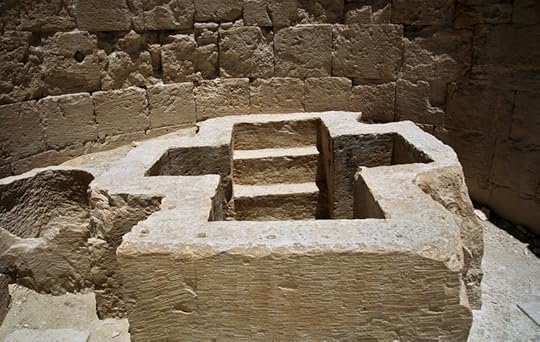 Believers would be baptized in this ancient Christian baptismal font, stepping down three steps into the water. The font was kept supplied with “living water” (i.e. running water) by a series of pipes and plumbing–the first directions (in chapter 7 of the Didache, written AD 60) for how to baptize said that it was always better to use living/running water for baptism. Baptism is what distinguished the Church from the pagan world. There could be no agreement between the Church and the world, between believers and the Devil, between Christ and Ceasar because–as Tertullian said in the 2nd century–if Ceasar were to be baptized he would have to renounce being Ceasar!
Believers would be baptized in this ancient Christian baptismal font, stepping down three steps into the water. The font was kept supplied with “living water” (i.e. running water) by a series of pipes and plumbing–the first directions (in chapter 7 of the Didache, written AD 60) for how to baptize said that it was always better to use living/running water for baptism. Baptism is what distinguished the Church from the pagan world. There could be no agreement between the Church and the world, between believers and the Devil, between Christ and Ceasar because–as Tertullian said in the 2nd century–if Ceasar were to be baptized he would have to renounce being Ceasar!What fellowship does light have with darkness? What does Christ have in common with Belial? What does a believer have in common with an unbeliever? What agreement is there between the temple of God and idols? For we are the temple of the living God …. (2 Cor. 6:14-16)
I have heard many preachers use this passage to insist that believers should not marry unbelievers. But there is no direct mention of marriage in this passage. The passage itself seems to suggest that there should be a radical separation between the Church and the society in which believers live. St. Paul seems to be saying that outside the Church there is nothing but darkness and devils; what could that world have in common with the Church, the Body of Christ and the light of the world?
The great teachers of the Church have understood this passage to condemn a person’s efforts to have two opinions in their own mind.
There cannot be two contradictory loves in one person. Just as there is no harmony between Christ and Belial, between justice and iniquity, so it is impossible for one soul to love both good and evil. You that love the Lord, hate evil, the devil; in every deed, there is love of one and hatred of the other. “He who has my commandments and keeps them is the one who loves me…” [John 14:21] You that love the things that are good, hate the things that are bad. You cannot love good unless you hate evil.
St. Jerome, Homily 73 on the Psalms
The Church understands that our baptism cannot be something that we put on or take off, depending on whether it is convenient on any particular day or not.
Neither the wetness of the water in which we are baptized not the oiliness of the oil with which we are anointed remain with us…. But the Holy Spirit, who is mingled in our souls and bodies through the oil and water, does remain with us, both in this life and after our death.
Philoxenus of Mabbug, On the Indwelling of the Holy Spirit
A person can try to have a foot in two camps but that never works. Not in the long run. If we are the temple of God because we are baptized and anointed, then we cannot also worship idols. Most baptized people don’t think they worship idols. But anytime we put ourselves first–before God’s command to love–we are making an idol of ourselves. Anytime I prefer injustice–because it is convenient for me–I am not loving my neighbor and I am worshipping the idol of myself.
If the Church cuts herself off from society, she cannot be the Church–the fountain of health, the fountain of salvation for the world. We cannot hide from the world and refuse to participate in it and still call ourselves followers of Christ. Even the hermits and monks in the desert did not cut themselves off from the world. They cut themselves off from distractions so that they could pray the more earnestly for the world and the people living in it. Scrooge in his counting house on a busy London street cut himself off from the world more completely than any monk or hermit ever did.
Jesus didn’t tell the apostles to teach all the nations so that the nations would believe what he said; he told the apostles to teach the nations so that they would obey what he said. (Matthew 28)
Obey. Do. “Love is the soul of justice; justice is the body, the flesh, of love.” (M. Borg and J. Crossan, The Last Week)
The post Christ vs. Belial? appeared first on Stephen Morris, author.
March 7, 2023
Synergy of Hands and Words
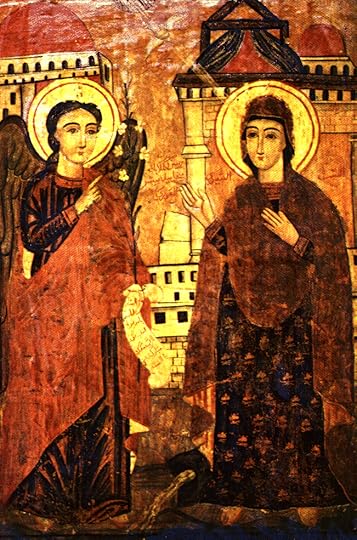 A Coptic icon of the Annunciation, showing the angel Gabriel presenting a lily as he announces the Incarnation to the Mother of God.
A Coptic icon of the Annunciation, showing the angel Gabriel presenting a lily as he announces the Incarnation to the Mother of God.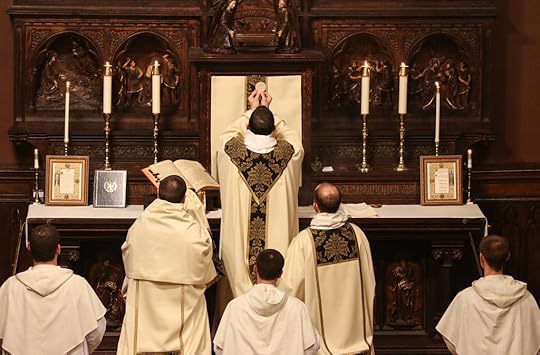 The elevation of the Host in a contemporary celebration of the Solemn Mass by Dominican religious.
The elevation of the Host in a contemporary celebration of the Solemn Mass by Dominican religious.Working together with God, then, we also entreat you not to receive the grace of God in vain. For he says: “In a favorable time I listened to you; on the day of salvation I helped you” (Isaiah 49:8). Behold, now it is the favorable time; behold, now is the day of salvation. (2 Cor. 6:1-2)
Synergountes de kai parakaloumen …. Synergy. Working together. Cooperation. We only experience “salvation” by working together with God. Any day we work together with him is the day of salvation.
Working together = cooperation with = synergy (fancy theological jargon)
Synergy = salvation
The classic, most clear example of synergy is the cooperation of the Mother of God with the request to bear the Word-made-flesh: “Be it unto me according to your word,” she answered the angel Gabriel. She cooperated with the request of God and the world was saved. If she had said “No,” we can only hope that God had a Plan B but there is no guarantee of that.
The Mother of God cooperated with God and the world was saved. We each personally make that salvation OURS when we approach the Holy Communion to receive the Body and Blood of Christ, harmonizing and uniting our Self with him. During the theological debates of what is the minimum necessary for an authentic celebration of the Eucharist, some said the Words of Institution (“This is my Body… Blood”) were the minimum necessary. Others said the invocation of the Holy Spirit (“Send down Your most holy Spirit to make this bread the Body of your Son ….”) was the minimum necessary.
What both sides presumed but never stated was that the priest also lent his hand to Christ to make the sign of the Cross over the Holy Gifts of bread and wine. The physical gesture was just as important–just as necessary–as the words theologians argued about. The priest’s hand had to cooperate/synergize with the words that he was saying and with the gestures that the Church expected him to make.
The priest’s gesture is as necessary as the priest’s words. That’s true for all of us. What we DO is just as important as what we say. “If someone says, ‘I love God,’ but hates a fellow believer, that person is a liar; for if we don’t love people we can see, how can we love God, whom we cannot see?” (1 John 4:20)
The post Synergy of Hands and Words appeared first on Stephen Morris, author.



